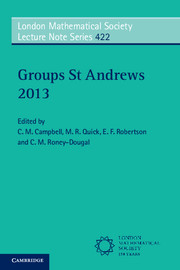Book contents
- Frontmatter
- Contents
- INTRODUCTION
- Approximate subgroups and super-strong approximation
- Width questions for finite simple groups
- Profinite properties of discrete groups
- GL(n, Z), Out(Fn) and everything in between: automorphism groups of RAAGs
- Permutation groups and transformation semigroups: results and problems
- New progress on factorized groups and subgroup permutability
- A survey on the normalizer problem for integral group rings
- A survey on Clifford-Fischer theory
- A generalisation on the solvability of finite groups with three class sizes for normal subgroups
- Automorphism groups of non-orientable Riemann surfaces
- What are the C2-groups?
- Resurrecting Wells’ exact sequence and Buckley's group action
- Recent work on Beauville surfaces, structures and groups
- Something for nothing: some consequences of the solution of the Tarski problems
- The groups of projectivities in finite planes
- On the relation gap and relation lifting problem
- Some results on products of finite subsets in groups
- Formal languages and group theory
- On the Castelnuovo-Mumford regularity of the cohomology of fusion systems and of the Hochschild cohomology of block algebras
- Recent advances on torsion subgroups of integral group rings
- On finite groups with small prime spectrum
- Solvability criteria for finite loops and groups
- The rational subset membership problem for groups: a survey
- A survey of Milnor laws
- Capable p-groups
- On the normal structure of a finite group with restrictions on the maximal subgroups
- Certain monomial characters and their normal constituents
- Recognition of finite quasi-simple groups by the degrees of their irreducible representations
- Generalized Baumslag-Solitar groups: a survey of recent progress
- Zeta functions of groups and rings – recent developments
A generalisation on the solvability of finite groups with three class sizes for normal subgroups
Published online by Cambridge University Press: 05 September 2015
- Frontmatter
- Contents
- INTRODUCTION
- Approximate subgroups and super-strong approximation
- Width questions for finite simple groups
- Profinite properties of discrete groups
- GL(n, Z), Out(Fn) and everything in between: automorphism groups of RAAGs
- Permutation groups and transformation semigroups: results and problems
- New progress on factorized groups and subgroup permutability
- A survey on the normalizer problem for integral group rings
- A survey on Clifford-Fischer theory
- A generalisation on the solvability of finite groups with three class sizes for normal subgroups
- Automorphism groups of non-orientable Riemann surfaces
- What are the C2-groups?
- Resurrecting Wells’ exact sequence and Buckley's group action
- Recent work on Beauville surfaces, structures and groups
- Something for nothing: some consequences of the solution of the Tarski problems
- The groups of projectivities in finite planes
- On the relation gap and relation lifting problem
- Some results on products of finite subsets in groups
- Formal languages and group theory
- On the Castelnuovo-Mumford regularity of the cohomology of fusion systems and of the Hochschild cohomology of block algebras
- Recent advances on torsion subgroups of integral group rings
- On finite groups with small prime spectrum
- Solvability criteria for finite loops and groups
- The rational subset membership problem for groups: a survey
- A survey of Milnor laws
- Capable p-groups
- On the normal structure of a finite group with restrictions on the maximal subgroups
- Certain monomial characters and their normal constituents
- Recognition of finite quasi-simple groups by the degrees of their irreducible representations
- Generalized Baumslag-Solitar groups: a survey of recent progress
- Zeta functions of groups and rings – recent developments
Summary
Abstract
Let N be a normal subgroup of a finite group G. In the recent past years some results have appeared concerning the influence of the G-class sizes of N, that is, with the sizes of the conjugacy classes in G contained in N, on the structure of N. In this survey, we present the main results and techniques used for proving that any normal subgroup of G which has exactly three G-conjugacy class sizes is solvable. Thus, we obtain a generalisation for normal subgroups of the classical N. Itô's theorem which asserts that those finite groups having three class sizes are solvable, and in particular, a new proof of it is provided.
Introduction
The solvability of a finite group G with three conjugacy class sizes is a complex problem solved by N. Itô in [22]. He proved that such groups are solvable by appealing to Feit-Thompson's theorem and some deep classification theorems by M. Suzuki. This result was simplified by J. Rebmann in [25] when G is an F-group (that is, G has no pair of non-central elements such that the centraliser of one element properly contains the other centraliser). Then he determined the structure of F-groups by using results of R. Baer ([8] and [9]) and M. Suzuki ([27]) about groups with a non-trivial normal partition. Afterwards, A.R. Camina proved in [14], by using the description of finite groups with dihedral Sylow 2-subgroups given by D. Gorenstein and J.H. Walter, that if G is not an F-group and has three class sizes, then G is a direct product of an abelian subgroup and a subgroup whose order involves no more than two primes. Forty years later, the structure of these groups has been completely determined (up to nilpotent groups, which in this context are p-groups) by S. Dolfi and E. Jabara in [15], who based their proof on the solvability of this type of groups.
- Type
- Chapter
- Information
- Groups St Andrews 2013 , pp. 173 - 182Publisher: Cambridge University PressPrint publication year: 2015

